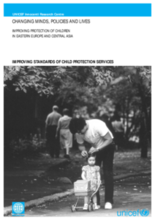The reforms undertaken during the transition to a market economy have had an uneven and divergent social impact on the countries within the Eastern Europe and Central Asia (ECA) region. It is now recognized by governments in many parts of the region that the policy of using institutional care for children with welfare needs is both ineffective and expensive. Despite reforms, the quality of care within institutions and in the new community- based services is still inconsistent and in many cases does not meet the requirements of the United Nations Convention on the Rights of the Child.
The challenge is to provide practical support and information for those in the ECA region wishing to improve the quality of existing services and ensure that new services have quality control built into them from the outset. The philosophy and nature of the child protection system needs to change and rendering it more standard-driven is just one element of the required reform. The improvement of standards should be seen within a framework that includes gatekeeping and the redirection of resources within a systemic framework. The aim of implementing systems to monitor and improve standards is to ensure that all services reach at least minimum standards and aim for excellence.
This Concept Paper sets out definitions of key concepts, gives an overview of what is needed to improve quality and examines the practical steps required for implementation. Developing standards, monitoring systems and quality improvement will constitute an effective basis for providing better services for children and their families as part of a strategic policy framework including gatekeeping entries to institutions and redirecting resources to community-based care. Ensuring better quality, preventing children who should not be in institutions from entering them, and steering financing towards services that can more effectively provide help, are the three most effective tools to promote the necessary reforms in child protection systems.
©UNICEF and The World Bank

